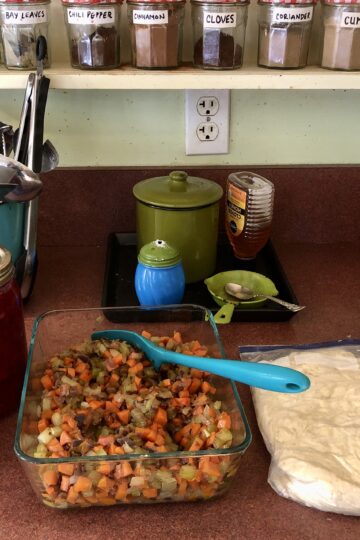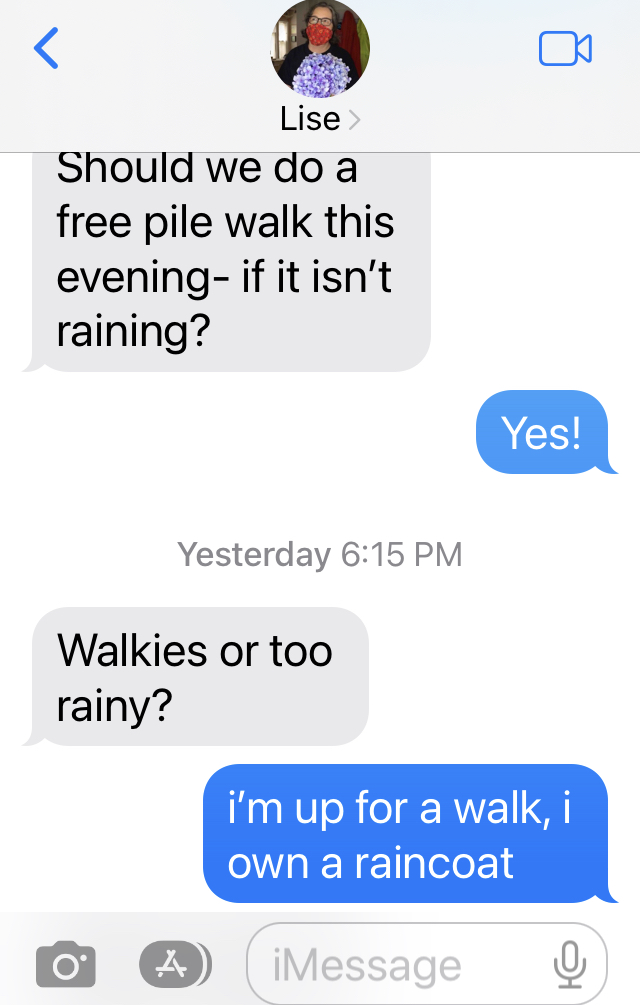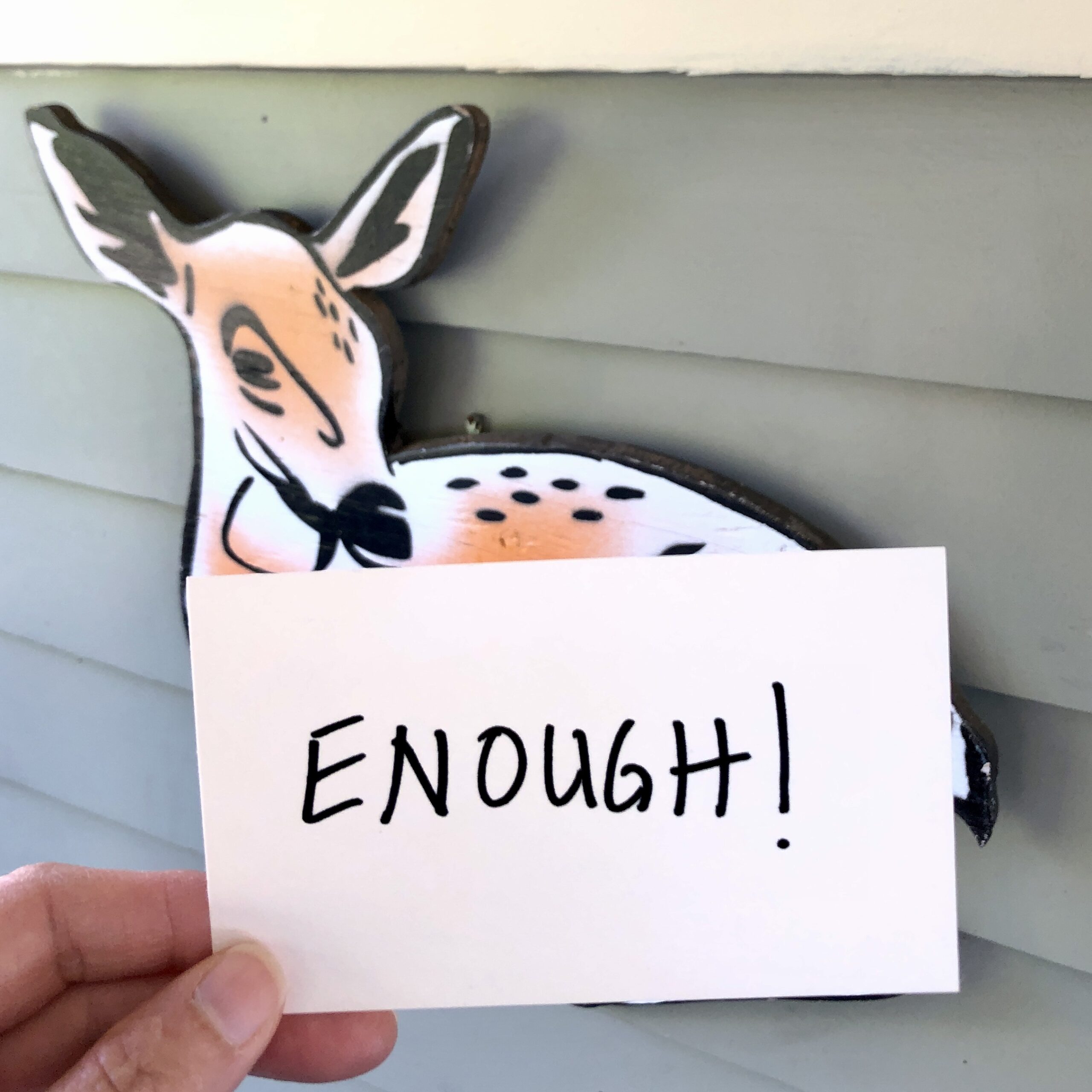Wants vs. Needs
The wants vs. needs mantra is popular in frugal circles. Food, housing, warmth are all needs, while piping hot steamy lattes and this year's tiny-bill-tweed-hat and are wants. (Man, am I sick of that hat!)
But are all wants inherently bad?
I want a nice home live in. If all I were addressing were my needs, then we'd be housed in a quonset hut, sleeping on mattresses on the floor. But comfort is also a need.
No two people will have the same wants and needs. I am totally fine owning three pairs of pants and four pairs of socks, but for you this might be a bypass your comfort point.
There are no hard and fast rules of what makes one thing a need, while another gets labeled a want.
William Morris' famous quote always comes in handy when mulling over this dilemma:
"Have nothing in your house that you do not know to be useful, or believe to be beautiful."
By following this sage advice, we can indulge both our wants and needs with equal measure. Thank you, Mr. Morris.
Katy Wolk-Stanley
"Use it up, wear it out, make it do or do without"
Click HERE to follow The Non-Consumer Advocate on Twitter.
Click HERE to join The Non-Consumer Advocate Facebook group.





Shades of gray. I both hate and love them.
Nice quote too.
Reminds me of a guideline about raising children -- I don't know who to credit it to -- Give them everything they need and some of what they want.
Another responsible maxim would be to make sure your wants don't cause others to lack their needs.
But to further this vein of thought would be to live like a monk in order to donate a majority of income to charity.
Katy
Or, as Ed Begley Jr. says, "Live simply so others can simply live".
I believe that the universe is always trying to even things out.
I don't have any answers, just the observation that it is really hard to follow Mr. Morris' rule when you have small children in the house! There seems to be a fine line between teaching them not to hoard junk, but also not purging their things without them having any control. Again, no answers, just a dilemma as a mom of three little people...
Ahh . . . I do believe that William Morris predated Toys R Us.
I involved my kids in decluttering their rooms when they were preschool age. I didn't want them becoming hoarders because they had a mommy who took their stuff away without their consent.
Katy
Last summer I put five bins of toys away in my basement in case anyone asked for the stuff. No one noticed and even I couldn't tell you what's in there at this point. I don't buy my kids a whole lot, but early on I had this problem with saying no. I took stuff from everyone because I thought I was saving money, but I was really just filling my house with other people's crap. My local Goodwill no longer accepts toys so now I have to figure out to do with all that stuff.
Freecycle?
Katy
I am signed up but still have never offered or taken anything. I need to get over my weirdness about having strangers come to my house. Apparently I'm a freecylce lurker - my local group seems lovely.
I suggest Freecycle or Craigslist too. I know it's weird to have people coming to your house, but I've never had an issue. Normally I just leave the stuff outside! You could always arrange to meet them somewhere.
I just have them tell me when they plan to come, tell them it will be alongside the driveway, and come get it. I make sure they know no-shows will not be given a second chance, otherwise you have no idea when to move on to the next person in line.
Hi Michelle! Have you thought about calling around to local daycares to find out if they can use some of the toys? I work with daycares in Florida and they are often in need of toys because theirs get broken so easily in big classes full of kids. I'm sure there's a classroom out there that would love to have your children's excess toys... hope that helps!
Toys always go like hotcakes on my freecycle group! I often put stuff in a bag on the porch when I've scheduled a pickup, just so I don't have to listen for the door all day.
Check with your local children's or women's shelter.
Thanks for all the suggestions - very helpful and this is going to be an ongoing process. After I tackle the toys it's on to my stuff.
I feel like if you could have a good conversation with kids about why you're getting rid of stuff (talking about the kids who need them, or don't have many toys, stuff like that) then they can definitely understand and be a part of the purge. I know the kids in my K-1 class get that, and I'm sure younger kids could too.
As for when they're too young to have a say, kids have their favorite toys, and I know this sounds mean, but I'm sure they wouldn't even notice if you take away toys they don't use a lot. I feel like kids have TONS of toys (from grandparents and parents too).
When I visited a community in South Africa of 100,000+ people who were living in houses patchworked together from corrugated metal and had not eaten for two days...and that was the norm... I decided to re-define my wants and needs.
Shelter, food, water and air to breathe...the very basics. EVERYTHING else is something that makes us more comfortable or pleases us aesthetically. I'm not saying we should all live with the minimum! But, our Americanized standards far exceed what is considered the minimum in a very large portion of the world. Keeping this in the back of our minds as we make choices about what to acquire for ourselves or share with others can make a world of difference to us as individuals and to those who we share with.
I like it very much that Cathy used the phrase "a world of difference." I've copyedited two editions of a book with that title, and this has really opened my eyes to First vs. Third World differences. I find that keeping the Third World in mind as I go about my business in the First makes it a whole lot easier to set priorities.
A. Marie...can you tell me the name of the author of the book? There are two or three listed on Amazon with that title and I'd like to read the particular one you wrote about. Thanks.
It's A World of Difference, Second Edition: Encountering and Contesting Development, by Eric Sheppard et al. It's actually a geography textbook (hence the price) and not very easy reading--but, as I said, it certainly woke me up.
Thank you, Cathy! I think we Americans (and westerners in general) get too hung up on comfort. I don't necessarily think we need to be horribly uncomfortable all the time, but a little discomfort here and there can be a simple show of solidarity with those who have nothing. I blogged about this a while back: http://adventuresinthriftland.blogspot.com/2011/01/idling.html
Laura...great blog and thank you for encouraging giving through World Vision. This photo is something that is on my mind constantly since I first saw it...totally puts things in a different perspective when I see or hear of people on a shopping binge. http://www.brutallyhonest.org/brutally_honest/2011/12/define-necessity.html
And thank you Katy for your blog, because the things that you encourage here make it possible for us to be able to save and then share more.
I grew up very poor and I moved near constantly. There were times we lived in a broken down bus or when my mum broke into my piggy bank to buy food.
I know that my paint, tea, and canvases are luxuries. I savor them. I also savor my long walks with the dogs, the days I have a sweet or a meat dish, and my big bed with several pillows. I don't need any of these to survive, but I feel I do need them to thrive. I think it is just being aware of what is really needed and acknowledging what is a luxury so that you can be grateful and enjoy it rather than take it for granted, always seeking new and more.
Somehow, paint, tea and canvases sound like nurturing expenditures rather than consumptive one. Oh, if we were all so mindful!
From my spendier days I acquired a lot of my wants...and I was just thinking how many of those wants turned into work. Stacks of books I felt obligated to read because I had bought them, tons of craft stuff purchased on a whim that loomed over me, gadgets for the kitchen that I felt guilty about never using, and yes, toys, heaps of them, that overwhelmed my kids. Now that we are way decluttered, we are happier. It's nice to just pick up a library book on a whim and not feel bad about it! Reminds me of something you hear on those hoarding shows---when everything is important, nothing is.
you are right, so freeing. Often we burden ourselves with our stuff that seems so important at the time but eventually presses some kind of obligation because we now don't want to "waste" the very thing we just had to have! Kind of like dieting, if there is something left on the plate that I really am too full to eat, and it has been reheated already and I just don't want to throw it out because of some non-wasting thing I learned as a kid, but no one else wants it either, eating it myself is no different than throwing it in the garbage because either way, it is wasted. Tough to learn, but valuable. I am not a garbage disposal and my house is not a storage facility! haha
ooooh I love that quote. Really helps put things into perspective. I appreciate that you permit our differences when it comes to wants and needs and express the importance of evaluating our own based on our own lives. I have been following your blog now for a few short months and I can say that your ideas have helped me to change my mind about several "purchases" and to clean out my cupboards even more than I usually do (and I usually do!) it has also helped me to develop more of a goal system as far as what I want to spend money on this year and what can wait because the long term goals I want to meet are more important than the thing which will bring me instant gratification.
There's a similar philosophy when dieting: eat only what's really delicious or good for you.
Snickers are extremely delicious! Just not a close-to-the-earth kind of food.
Katy,
I'm 17 days into no purchasing of new material goods.
🙂
I've been trying to make decisions based on my long-term wants as opposed to my immediate wants, and stopping to ask myself which of those wants a given purchase would fulfill has really helped. I find it much easier, for example, to say no to pastry from the fancy bakery when I realize I don't actually "want" the calories and the expenditure of money--I really "want" the weight loss and the money savings. Somehow the choice puts me in control and makes me feel less "deprived."
Katy, I love this post. I think it's all just a balancing act. I try to be mindful of the many "extras" in my life, but I don't beat myself up about them. Instead, I try to help others out when I can and be reasonable about my own wants.
One of my best tricks for determining which "wants" really matter is to put the "want" on hold for a little while. If I still want it in a month or two, chances are good that I probably really do want it and will get some real use out of it. (Yes, I really did want that composter I had researched and was eyeing for months.) But most of the time, something I think I want today doesn't seem so desirable after I've given it some time - most "wants" really do seem to pass rather quickly. (No, I really didn't want that sweater/candle/jar of Nutella that much - in fact, I forgot about it by the time I was home.) I think this is a result of living amidst so much advertising and materialism - it's almost impossible not to find oneself tempted - at least briefly - by "things". But give it a little while, and the temptation very often just wears off - at least it does for me.